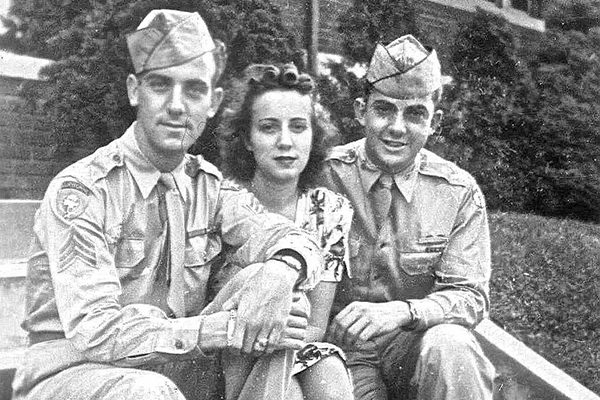Raymond W. Cromer

“As a 2011 UNC Charlotte graduate, I am so happy that our Forty-Niner marching band can experience this great event, and that my immediate and extended Cromer family can relive my grandfather’s story. For as it is commonly said of the millions of men and women who rose out of the Great Depression to become the brave and courageous Americans who put their lives on the line for our freedom, they truly are ‘The Greatest Generation.’ Thank you for the honor that you are bringing to that generation and to all who have served.”
– Curry Cromer ’11
Raymond W. Cromer, remembered by his grandson, Curry Cromer
Raymond W. Cromer entered the war as a Second Lieutenant infantryman in the 71st Division of the U.S. Army, and eventually walked across Europe.
In April of 1945, just a couple weeks before VE Day on May 8, which marked the end of the war, my grandfather was asked by his commanding officer to take a message to a general some distance away. He got in a jeep with another soldier and proceeded on his way, accompanied by another jeep that was carrying two soldiers.
On their way, a group of Nazi SS soldiers, who were situated on a large hill above the road, opened fire on them. Both of their jeeps were hit and ran off the road into a ditch. Pinned down and fairly defenseless, my grandfather saw a farmhouse about 100 yards away and decided to make a run for it, where they felt they could better defend themselves.
One of the men was killed while crossing the open field, but my grandfather and another man made it safely. The fourth soldier actually disappeared, and they had no idea what happened to him.
Upon entering the farmhouse they were met by an old man, an old lady and a little boy. My grandfather happened to have a German Luger pistol that he had gotten off a dead German several months before. Knowing that if the Luger was found in his possession he would be shot immediately by the Germans, he hid it up in the timber beam of the farmhouse.
The house was surrounded by German soldiers, and my grandfather and his comrades had no choice but to surrender. They were taken prisoner and marched off by the Germans. It turned out that the commanding officer leading the Nazis was a German prince who was very well educated and spoke English.
In a series of conversations that would portend what a great attorney and litigator my grandfather would later become, he discussed several things with the prince. Appealing to his humanitarian emotions, my grandfather explained how he wanted to get back safely to his family and suggested the same sentiments to the prince and his desire to get back to his own family as well.
He also told the prince that the handwriting was on the wall and that all indications were that the war was in its last weeks. The American front line had already advanced so far forward that my grandfather’s German captors were, in fact, trapped behind the front line.
So basically my grandfather communicated to the Germans that they would soon be captured themselves by the Americans, so it would go much better for them if they would not harm their prisoners and would come to the smart decision to let them go — which is exactly what they did.
Upon being released after being held for only a day and a half, my grandfather and his friend found their way back to the farmhouse, where they were reunited with the missing soldier who mysteriously disappeared. Turns out he had hidden out in the woods behind the house. They were also met there by their commanding officer and a large contingent of American soldiers who went looking for them after they never made it to the general’s location.
Before leaving the area, my grandfather made sure to enter the farmhouse so he could get the Luger out of the rafters. My dad is the proud owner of that German Luger to this day.
But that is not the end of the story.
Fast forward some 50 years after the war to the mid-1990s, when my grandfather and grandmother were on one of their many trips to Europe. While traveling in Germany, my grandfather decided he would like to try to find the village where he was captured, a small hamlet called Schmidtstadt.
They were in the general vicinity but were unable to find it, so they went into a small post office to inquire about the village’s location. The postmaster himself didn’t know, but there was an elderly gentleman who overheard the inquiry and offered to lead my grandparents some 20 kilometers away to the village. Arriving to the area, my grandfather thanked the man and proceeded to explore the village.
As they were proceeding down the road they came around a curve and there, to my grandfather’s shock and excitement, was the actual farmhouse where he was captured. He just could not believe that it was still there after nearly 50 years, and a flood of emotions and memories began to overtake him.
As they got closer they saw that the house had now been turned into a restaurant, so my grandparents decided to have lunch and a few beers.
While they were eating, a man, seemingly the owner, was making the rounds from table to table and soon approached my grandparents and started talking to them. Naturally my grandfather began to recount the story how he was an American GI and how some 50 years earlier he was captured right there in that very house.
Upon hearing that, the owner smiled and looked into my grandfather’s eyes and said, “I know, I was the little boy.”